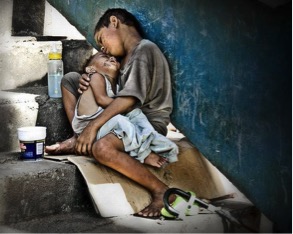Social Justice
What do you think most people say social justice is? For most people, social justice means how benefits are distributed in society. But the original notion of social justice had nothing to do with the distribution of anything.
The popular understanding of social justice is captured by the American Sociological Review:
As I see it, social justice requires resource equity, fairness, and respect for diversity, as well as the eradication of existing forms of social oppression. Social justice entails a “redistribution” of resources from those who have “unjustly” gained them to those who justly deserve them, and it also means creating and “ensuring” the processes of truly democratic participation in decision-making…. It seems clear that only a “decisive” redistribution of resources and decision-making power can “ensure” social justice and authentic democracy.[2]
Arithmetical uniformity is at the heart of this new definition. It is full of indictments and an “us against them” flavor. More importantly, it requires an agent in charge of imposing an understanding and “ensure” that it is observed. This is really a dreadful change in the meaning of social justice because to accomplish that you must give a whole lot of power to the equalizer. The concept of re-distribution implies that benefits are not earned in the first place so the success of some is in some measure uncalled for and in need of redress. Who is supposed to balance things? The state.
Another word associated with social justice is “the common good.” A wonderful term that in practice, often hinges on a key question, namely, who decides what is the common good. In contemporary times that responsibility gradually shifted to the bureaucratic state. Quickly, the beautiful notion of the common good got ensnared in red tape and in battles for power. The common good has become an excuse for state control and government decision-making. So much that most people think of the government and “what are they going to do” every time there is a crisis. Interestingly, the common good has often been the excuse on which totalitarianism has been built. You can achieve the common good better if there is a total authority, and that limits the desires and actions of individuals.
Another word associated with social justice is compassion. The most extraordinary thing since about 1832 is that many bad things are done in the name of compassion for the poor. Modern revolutions are almost all fought in the name of the poor and the oppressed. More sins have been committed in the name of compassion in the last 150 years than by any other force in history. We must not allow that beautiful term “compassion” to blind us.
The loss of the traditional understanding of social justice has resulted in confusion and an abandonment of the term by many. The concept of justice pertains to what is owed to a person. It is primarily a virtue of individuals. I must develop the sense that I must give to others what they deserve. A person is just when that person develops the habit of giving to others (either other individuals or a community) what is owed to them. The scholastics referred to social justice as general or legal justice. Social justice directs the acts of individuals toward the common good. In the end, I agree with Michael Novak when he said that social justice is a virtue of individuals or it is a fraud.
Alexis de Tocqueville said the most fascinating and insightful thing about America that relates to the authentic sphere of social justice. In America, people got together and formed associations. They hold bake sales to send missionaries to the Antipodes, to build colleges. They invent a hundred devices to raise money among themselves. That’s what a free people do.
And that’s what, in a word, social justice is–a virtue, a habit that people internalize and learn a capacity. It’s a capacity that has two sides: first, a capacity to organize with others to accomplish particular ends and, second, ends that are extra-familial. They’re for the good of the neighborhood, or the village, or the town, or the state, or the country, or the world.
Finally, it’s important to note that this notion of social justice is ideologically neutral. It’s as common to people on the Left to organize and form associations, to cooperate in many social projects, as it is to people on the Right. This is not a loaded political definition, but it does avoid the pitfall (on the Left) of thinking that social justice means distribution, égalité, the common good only as determined by state authority, and so forth. It also avoids the pitfall (on the Right) of thinking of the individual as unencumbered, closed-up, self-contained, self-sufficient and interested only in personal benefit.



